Recent News
- Sustainable IoT system for freshwater pearl farming July 26, 2022
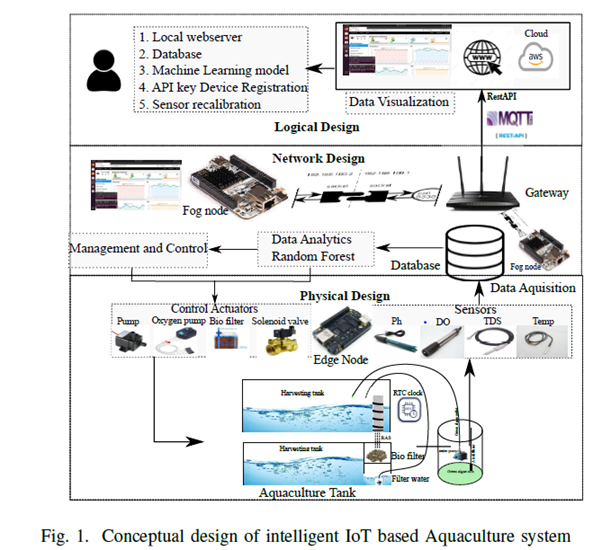
The Department of Computer Science Engineering is glad to announce that Dr Kshira Sagar Sahoo, Assistant Professor, has published an article titled ‘Sustainable IoT Solution for Freshwater Aquaculture Management’ in the Q1 journal, IEEE Sensors, having an Impact Factor of 4.325. The research was published in collaboration with Munesh Singh, from the Department of Computer Science and Engineering, PDPM IIITDM Jabalpur Campus, Madhya Pradesh, and Anand Nayyar, Graduate School, Faculty of Information Technology, Duy Tan University, Vietnam.
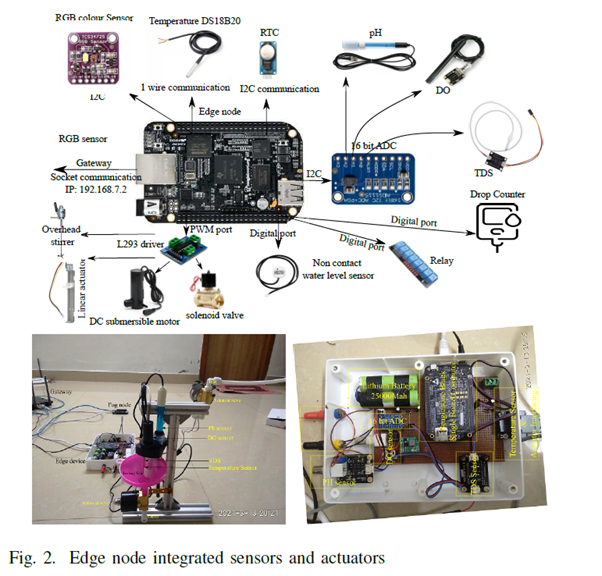 Freshwater pearl farming has the potential to generate an alternative source of income for small farmers. Indian freshwater river bodies have 51 types of species that can produce pearls. Still, India imports 2.4 billion dollars’ worth of pearls from China and Japan. To reduce the import burden on the Indian economy, the government encouraged the farmers to do integrated freshwater pearl farming. Aquaculture-based farming needs a small investment for the initial setup. Although the Indian government promotes aquaculture-based farming through subsidies and free training programs, farmers find it difficult to get success in aquaculture-based farming.
Freshwater pearl farming has the potential to generate an alternative source of income for small farmers. Indian freshwater river bodies have 51 types of species that can produce pearls. Still, India imports 2.4 billion dollars’ worth of pearls from China and Japan. To reduce the import burden on the Indian economy, the government encouraged the farmers to do integrated freshwater pearl farming. Aquaculture-based farming needs a small investment for the initial setup. Although the Indian government promotes aquaculture-based farming through subsidies and free training programs, farmers find it difficult to get success in aquaculture-based farming.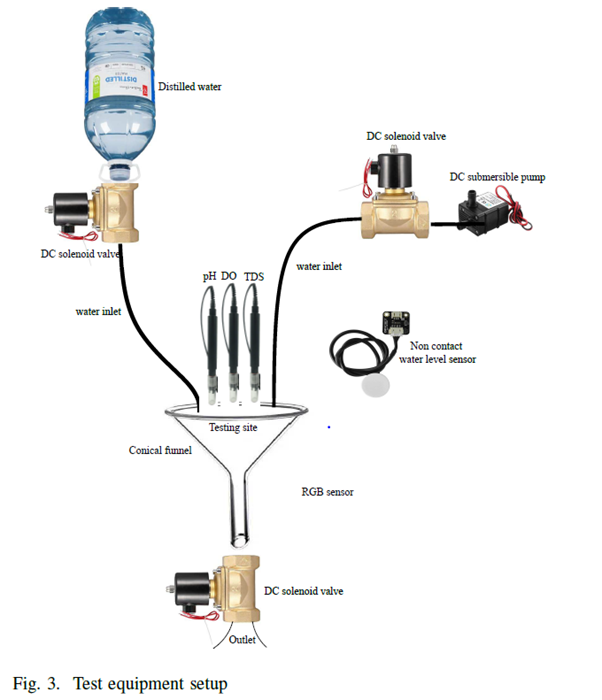 The paper proposes a comprehensive IoT system for freshwater pearl farming which has an intelligent control system for maintaining the aquaculture environment. The proposed system monitors and supports the habitable underwater environments for aquaculture. To train the farmers and educate them in pearl farming business is a time taking and skill-oriented job. The comprehensive IoT system will encourage farmers for freshwater pearl farming and proper utilisation of the government subsidy granted for aqua farming. In future, the researchers will consider more relative water parameters for robust forecast and analyse the best model for predictive analysis.
The paper proposes a comprehensive IoT system for freshwater pearl farming which has an intelligent control system for maintaining the aquaculture environment. The proposed system monitors and supports the habitable underwater environments for aquaculture. To train the farmers and educate them in pearl farming business is a time taking and skill-oriented job. The comprehensive IoT system will encourage farmers for freshwater pearl farming and proper utilisation of the government subsidy granted for aqua farming. In future, the researchers will consider more relative water parameters for robust forecast and analyse the best model for predictive analysis.Abstract of the Research
In recent years, we have seen the impact of global warming on changing weather patterns. The changing weather patterns have shown a significant effect on the annual rainfall. Due to the lack of annual rainfall, developing countries like India have seen a substantial loss in annual crop production. Indian economy largely depends on agro products. To compensate for the economic loss, the Indian government encouraged the farmers to do integrated aquaculture-based farming. Despite government subsidies and training programs, most farmers find it difficult to succeed in aquaculture-based farming. Aquaculture farming needs skills to maintain and monitor underwater environments. The lack of skills for monitoring and maintenance makes the aquaculture business more difficult for farmers. To simplify the pearl farming aquaculture, we have proposed an Internet of Things (IoT)-based intelligent monitoring and maintenance system. The proposed system monitors the water quality and maintains an adequate underwater environment for better production. To maintain an aquaculture environment, we have forecasted the change in water parameters using an ensemble learning method based on random forests (RF). The performance of the RF model was compared with the linear regression (LR), support vector regression (SVR), and gradient boosting machine (GBM). The obtained results show that the RF model outperformed the forecast of the DO with 1.428 mean absolute error (MAE) and pH with 0.141 MAE.
- Pre-existing health conditions and the risk of Covid-19 July 26, 2022
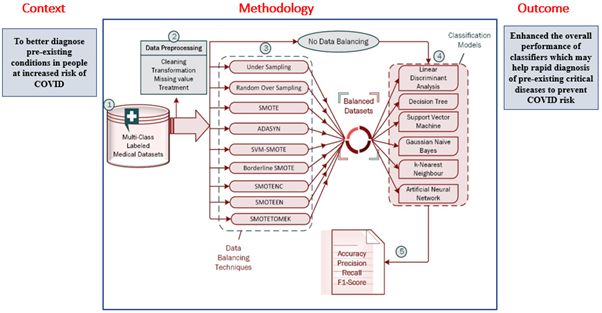 Individuals with pre-existing medical conditions are more vulnerable to Covid-19 and its variants. Patients in countries like India require early testing to diagnose crucial disorders to reduce the risk. Research at the Department of Computer Science and Engineering has come up with a system that automatically identifies and categorises diseases based on the patient’s medical test results. Assistant Professor Dr Ravi Kant Kumar published a paper Improving Performance of Classifiers for Diagnosis of Critical Diseases to Prevent COVID Risk as a co-author in the Q1 journal Computers and Electrical Engineering and has an impact factor of 4.152. With an accurate diagnosis, the required actions can be planned and executed to stop the patients from serious health issues as well as covid risk.
Individuals with pre-existing medical conditions are more vulnerable to Covid-19 and its variants. Patients in countries like India require early testing to diagnose crucial disorders to reduce the risk. Research at the Department of Computer Science and Engineering has come up with a system that automatically identifies and categorises diseases based on the patient’s medical test results. Assistant Professor Dr Ravi Kant Kumar published a paper Improving Performance of Classifiers for Diagnosis of Critical Diseases to Prevent COVID Risk as a co-author in the Q1 journal Computers and Electrical Engineering and has an impact factor of 4.152. With an accurate diagnosis, the required actions can be planned and executed to stop the patients from serious health issues as well as covid risk.Abstract
The risk of developing COVID-19 and its variants may be higher in those with pre-existing health conditions such as thyroid disease, hepatitis C virus (HCV), breast tissue disease, chronic dermatitis, and other severe infections. As a result, early and precise identification of these disorders is critical. A huge number of patients in nations like India require early and rapid testing as a preventative measure. Machine learning methods for automatically identifying and classifying diseases have been created, and they function effectively when the dataset is well specified and balanced at every class level, including “no disease”. The problem of imbalance arises from the skewed nature of data, in which a large number of cases belonging to one class (known as the majority class) are classified correct, while the other class (known as the minority class) has lesser instances; is unfortunately misclassified by many classifiers. When it comes to human life, this kind of misclassification is unacceptable. To solve the misclassification issue and improve accuracy in such datasets, we applied a variety of data balancing techniques to several machine learning algorithms. The outcomes are encouraging, with a considerable increase in accuracy. As an outcome of these proper diagnoses, we can make plans and take the required actions to stop patients from acquiring serious health issues or viral infections.
Explanation of the research
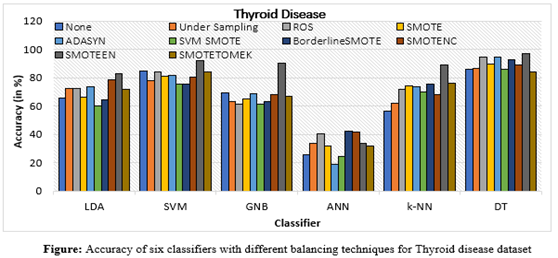 Lethal COVID-19 and its mutant forms may be more likely to arise in patients with pre-existing medical conditions such as thyroid illness, hepatitis C virus (HCV), breast tissue disease, chronic dermatitis, compromised immune systems, obesity, diabetes, heart disease, cancer, etc. For patients, an early and accurate diagnosis of these illnesses is crucial. Based on patient data, machine learning algorithms can assist in the early and quick detection of numerous diseases in a huge population like India. On the other side, machine learning algorithms perform poorly when a dataset has a class unbalanced problem. As a result, we used a variety of smote and its variants in this study to address the problems about the imbalanced class size. The experimental work showed that all six classifiers (DT, SVM, LDA, k-NN, GNB, and ANN) performed better overall on clinical datasets when class balancing strategies and classification techniques were combined. It recommends the use of the recommended classifications and class balancing technique with regard to specific data to identify the disease accurately and automatically
Lethal COVID-19 and its mutant forms may be more likely to arise in patients with pre-existing medical conditions such as thyroid illness, hepatitis C virus (HCV), breast tissue disease, chronic dermatitis, compromised immune systems, obesity, diabetes, heart disease, cancer, etc. For patients, an early and accurate diagnosis of these illnesses is crucial. Based on patient data, machine learning algorithms can assist in the early and quick detection of numerous diseases in a huge population like India. On the other side, machine learning algorithms perform poorly when a dataset has a class unbalanced problem. As a result, we used a variety of smote and its variants in this study to address the problems about the imbalanced class size. The experimental work showed that all six classifiers (DT, SVM, LDA, k-NN, GNB, and ANN) performed better overall on clinical datasets when class balancing strategies and classification techniques were combined. It recommends the use of the recommended classifications and class balancing technique with regard to specific data to identify the disease accurately and automaticallyFor this work, Dr Ravi Kant Kumar has collaborated with Mr Vinod Kumar, Koneru Lakshmaiah Education Foundation, Vaddeswaram,India, and Mr Gotam Singh Lalotra, University of Jammu, India. Their future research will investigate and design the most effective multi-class balancing method to address the multi-class imbalance problem in medical data.
Continue reading →

